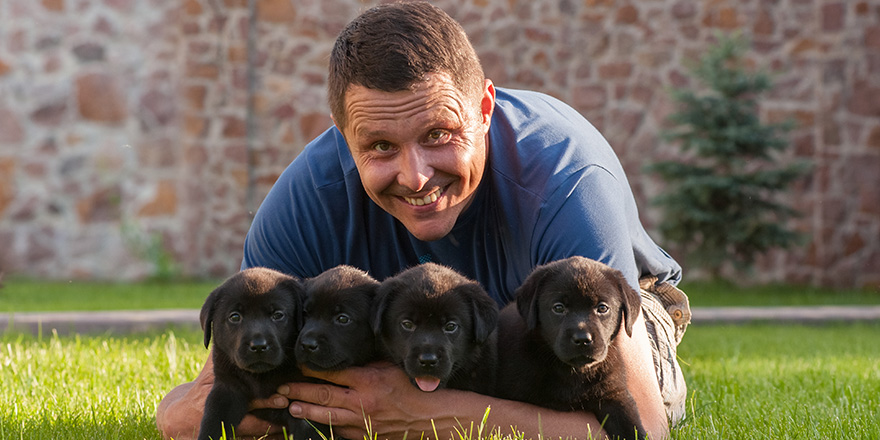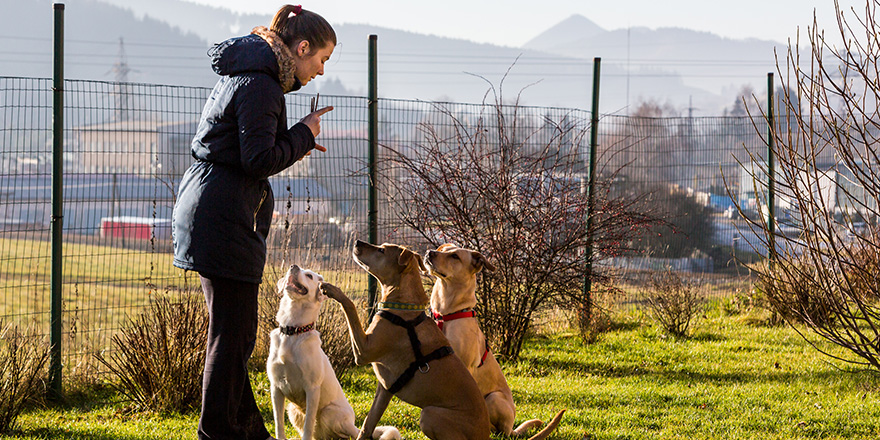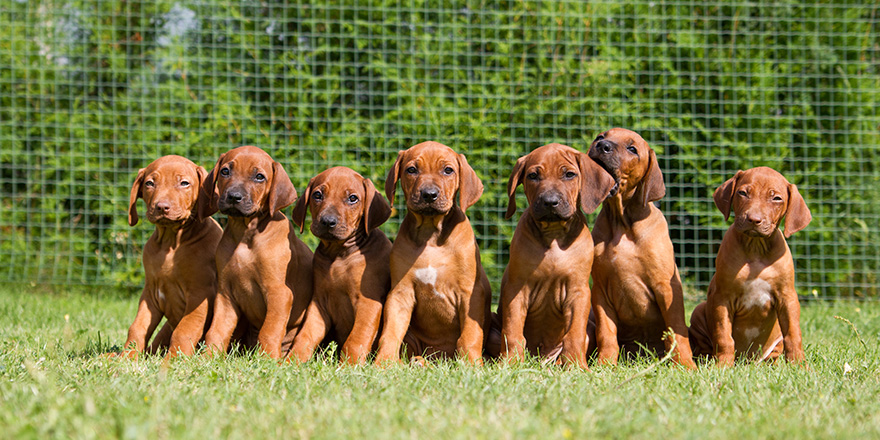When expanding your family with a new canine member, you want to ensure you’re getting them from a responsible dog breeder. A responsible breeder will put the time and effort into ensuring the puppy’s health and that it will go to a good home. Responsible breeders will also know the breed-specific traits, be capable of giving good advice, and provide proper care for your new fur baby until it can come home. Backyard breeders often do not provide the level of care, nor can they be trusted to give accurate advice. Knowing what to look for can help you to avoid the unfortunate possibility of purchasing from a puppy mill.
What is a Backyard Breeder?
A backyard breeder practices reckless breeding by carelessly overbreeding dogs to produce large amounts of dogs to turn a profit. Bad breeding often results in behavior problems, health complications, or even death. Backyard breeders are usually unlicensed to save money, as large kennels generally require a license to be used. Many corners are often cut in backyard breeding.
The most severe cases result in puppy mills which are often cramps and overpopulated, with the puppies and their parents often being mistreated and locked away until they are sold. In these situations, the mother is not uncommon to die due to being overworked, overbred, underfed, uncared for, or by general birth-related complications.
Potential Health Problems From Bad Breeding
A wide variety of risks come hand in hand with purchasing dogs from bad breeders. A purebred puppy should always be carefully bred so as not to carry down specific breed-related health concerns and genetic defects. Certain birth defects can be unavoidable with particular breeds, but you should always know what constitutes ill health that should be of concern.
A trustworthy dog breeder should be able to provide a health guarantee due to the puppies’ parents and be more than happy to disclose any health issues the puppy may have. Below are the types of complications you could expect due to irresponsible breeding.
- Skeletal deformities and joint problems include a misshapen muzzle or jawline, curved spine, hip dysplasia, osteochondrosis dissecans, Hypertrophic osteodystrophy, Multiple cartilaginous exostoses, extra toes, and fused toes. Even purebred dogs can have these problems, so it is important to recognize an irresponsible breeder from a responsible one.
- Behavioral complications: When incorrectly bred, a dog can be more prone to aggression and antisocial behavior problems.
- Sensory problems such as blindness or deafness.
- Respiratory or cardiovascular weaknesses such as heart defects and difficulty with breathing, be it due to a lung problem or a deformed muzzle preventing easy breathing.
- Neurological problems can cause predispositions to seizures and epileptic fits.
- Shortened life expectancy results from the potential health concerns caused by improper breeding.
- Digestive sensitivities: Many irresponsibly bred dogs have sensitivities to many more things than their properly bred counterparts. This includes lactose, wheat, grain, certain proteins, fruits, and veg.
- Skin problems: Not only can they have digestive sensitivity, but they are more likely to develop skin problems and struggle with seasonal allergies.
Signs of a Backyard Breeder

It’s best to recognize the warning signs of backyard breeding to know whether or not you’re getting your puppy from a responsible breeder. Fortunately, there are quite a few signs you can look for easily enough.
1. Prices
Quite often, a backyard breeder, or owners of puppy mills, will sell the puppies for a lot less than the breed is worth. This is an immediate red flag. If a puppy looks like a great deal, it will cost you more in the long run. A cheap puppy means they are likely unlicensed, unchecked, and hastily bred. Many dog owners that purchase dogs from puppy mills find the dog is more expensive to insure and often requires a lot more veterinary care throughout its life.
2. Lack of Communication
Responsible breeders will keep in touch with you constantly to update you on your puppy’s progress before you bring it home. A bad breeder will likely avoid contact unless necessary – maybe not even then.
3. Restricting Visits
A bad breeder wouldn’t want to risk you seeing something that could incriminate them or give them away are reputable breeders. Therefore they will likely only let you visit on their terms or extremely infrequently. This is often so that they can ensure any evidence of improper breeding is out of sight. So restricted visits are usually not a good sign.
4. Lack of Breed Knowledge
They may not know much about their animals outside of their basic needs. They especially won’t be very well informed on the specifics of the breed you’re looking to purchase. As a result, they’re incapable of talking much about the breed in question and cannot be trusted to provide good advice about their care.
5. Puppy’s Age
Responsible breeding entails knowing when puppies are ready to be parted from their mother and understanding their overall needs. Dogs don’t do well being parted from their mothers early and have been known to die of fading puppy syndrome due to early separation. If the breeder wants to separate the puppies any earlier than 8-12 weeks, they are not looking out for their wellbeing. There’s a possibility they are trying to clear out unwanted litter or make space for a litter they expect.
6. The Breed
Is the dog what the breeder says it is? It is best to familiarise yourself with the breed standard before approaching a breeder. A bad breeder may mix similar dog breeds and then attempt to sell them as purebred or a crossbreed when they are a mixture of three or more. The more you know about the breed you are wanting, the easier you can spot if something is not right about the puppies the dog breeder is selling.
7. Where They’re Selling
Avoid purchasing a dog from anyone with puppies listed on sales websites such as Craigslist, Facebook Marketplace, or eBay. Breeders should be advertising the sale of their puppies on legitimate breeder websites such as the American Kennel Club Marketplace or the local shelter. Be sure to check that the shelter vets its sellers before allowing advertisement.
8. Too Many Dogs
If a person operates like a puppy mill, you will notice they have multiple litters at once. These are the types of people who promise they can get you any color or breed that you want. A good breeder should not have access to such a wide range of dogs at one time. Good breeders will only have one, maybe two litters at one time that are carefully cared for. Too many can become overrun, resulting in an inability to care properly for all puppies at once. The only exception would be a pet store, which is staffed with enough people to properly care for the puppies they sell.
9. No Registration or Club Membership
If the breeder cannot present you with registration papers, the dog is an unregistered puppy. And while registration is not the be-all and end-all, it can ensure that they are in the best shape they can be. Pet stores must be licensed or registered under the Animal Welfare Act, so check that the breeder can prove their ability to breed dogs Blasé before continuing.
How to Avoid an Irresponsible Breeder

Now that you know what makes backyard breeders what they are, you can pre-plan how to go about getting a new puppy. Therefore allowing you to know the dog breeders to avoid. You should also take this approach if you want to adopt a dog by paying an adoption fee. Some bad breeders will attempt to sell puppies at a massively reduced price under the guise of adoption.
Learn to Spot The Signs
Now that we have listed everything that you should expect to see with a backyard breeder, this should make spotting the signs a little bit easier. The most obvious is whether or not the breeder is staying in contact with you. If they breed dogs for a living, they should know to stay in contact with the dog’s future owner to secure their trust. If the breeder is skirting around your messages or refusing to answer, it may be worth looking elsewhere.
Ask Questions
Don’t be afraid to ask lots of questions. As a new dog owner, the breeder should expect you to fire plenty of questions their way. Any breeder worth their salt should pay attention and answer them to the best of their ability. Here are a few examples of things you could ask:
- How long have they been in business?
- Request references from previous buyers.
- Ask for vet records, proof of any health tests, and information on their screening processes.
- Check if the puppies are up to date with their vaccines and whether they are wormed.
- Ask whether they would be willing to take the dog back should your circumstances change to ensure a good family adopts them (though note that a refund would be out of the question).
You should also be prepared to be asked questions in return. If the breeder doesn’t ask you anything about yourself, your living situation, or how to intend to care for the dog, then this shows they are not interested beyond the dog leaving their property. A blasé disregard for the dog’s wellbeing can be a red flag.
Don’t Take a Puppy Home at The First Meeting
The breeder should not be willing for you to walk out with a puppy after a single meeting. Not even shelters allow this type of adoption for their animals. Each new owner should be vetted to ensure the dog is going to a good forever home. Not only can this show disregard for their dogs, but it can also indicate that all is not what it seems.
Breeding dogs can be an expensive endeavor, especially if one of the dogs is born with complications. Therefore some bad breeders will attempt to palm the dog off on the first person that shows interest to avoid the expense. They will then claim ignorance should you communicate problems with them, or sometimes will cut all contact.
Don’t Buy From a Third Party
Don’t purchase a puppy from someone who says they “know a great breeder”, or even someone who claims one of their family members is a good breeder. This is an immediate red flag. If they know a breeder, they should be pointing people to that breeder directly, not selling on their behalf. A reputable rescue group would not sell through a third party, they would only accept prospective pet parents directly. It’s the same story with breed club breeders.
Backyard Breeder vs. Reputable Breeder

Disreputable breeders are just about everywhere. The same can be said of puppy mills. Unfortunately, no matter how many of these breeders are shut down, they will continue to crop up. Backyard breeders, in particular, manage to fly under the radar under the guise of being unsuspecting dog owners just looking to give their litter to a good home. They will also operate swiftly to rid themselves of their puppies in time for the next litter. More and more dogs are being affected as a result of irresponsible breeding. The less care that is taken when breeding dogs, the more likely they will develop long-term health issues or even die during infancy. Adult dogs used for breeding can be killed by overbreeding – especially the mothers.
The difference between bad breeders and reputable breeders is extensive. Bad breeders show complete disregard for the well-being of their animals and are out to get a quick buck at the expense of the dog and its new owner. Reputable dog breeders put a lot of time, energy, and money into ensuring their dogs are at peak health. They care for the dogs as if they are family and are extremely careful to ensure every puppy goes to a good forever home. Though reputable breeders are often quite a bit more expensive, it is worth the investment if you are looking to buy from a breeder, as your dog will have a much healthier life.
If you ever think you have come across a bad breeder or potential front for a puppy mill, be sure to contact the local animal rescue authorities and alert them to the situation. This will trigger an investigation, hopefully leading to the mill’s closure and confiscation of the animals to be cared for and given away to good homes.







